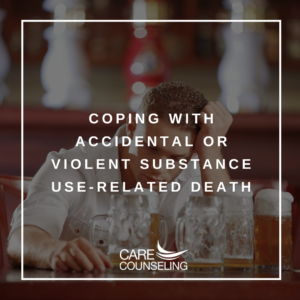Coping with Accidental or Violent Substance Use-Related Death
 It started as a good time—celebrating with friends, enjoying the moment, and losing inhibitions. Fast forward: coping with the aftermath feels unbearable. The ending of what started as a “good time” ended wrong with tragic consequences: loss of life, legal consequences, and decisions that cannot be undone. Drugs and alcohol seemed like friends at the time, but now they are painful, traumatic grief reminders.
It started as a good time—celebrating with friends, enjoying the moment, and losing inhibitions. Fast forward: coping with the aftermath feels unbearable. The ending of what started as a “good time” ended wrong with tragic consequences: loss of life, legal consequences, and decisions that cannot be undone. Drugs and alcohol seemed like friends at the time, but now they are painful, traumatic grief reminders.
Drinking and driving while intoxicated and ending in loss of limbs, body movement, or life…
Substance use resulting in accidental overdose or death by suicide…
Intimate partner violence, homicide, or community violence involving substances, involving actual or threatened death…
These are several examples of substance-use-related deaths that are accidental or violent. The injuries and deaths could have been prevented. No one wanted this to happen, yet the impacts affect families, friends, and communities in profound ways.
Unintentional injuries such as opioid overdoses are the leading causes of death of Americans ages 1-44. Suicide is 2nd for this age group and homicide comes in 5th.
There is still a lot of stigma attached to substance use, especially deaths related to use such as drug overdose. Feelings can be internalized as shame. It can be easy to isolate yourself from the rest of the world as you sit with feelings of grief, loss, and trauma which may develop into prolonged grief disorder or post-traumatic stress disorder.
You may feel as though a part of yourself has died as you experience intense emotional pain such as feelings of anger, bitterness, or sorrow related to the death. Life may feel empty or meaningless after losing a loved one in such as horrific way. Emotional numbness may be present. You may be experiencing nightmares, flashbacks, and physiological responses to reminders of the trauma. You may no longer feel physically or emotionally safe after what happened. Sleeping and concentrating can be difficult. Intense loneliness may set in but being able to reengage with others can feel too heavy.
Those suffering from the impact of loss after substance use need support. At CARE Counseling, our therapists are available to provide empathetic listening and show compassion during this difficult time. They work with grief, loss, and trauma and can also help connect you with additional resources. While having someone to connect with 1:1 is helpful, so are group settings to connect with others experiencing similar challenges. Support is just a phone call or click away.
Resources:
Substance Abuse and Mental Health Services Administration (SAMHSA)
https://www.samhsa.gov/find-help/national-helpline
Parents of Addicted Loved Ones
Grief Recovery After a Substance Passing
The National Child Traumatic Stress Network
https://www.samhsa.gov/find-help/national-helpline
Trauma Network Survivors
https://www.traumasurvivorsnetwork.org/
988 Suicide and Crisis Lifeline
Written By: Charlotte Johnson, MA, LPCC



























